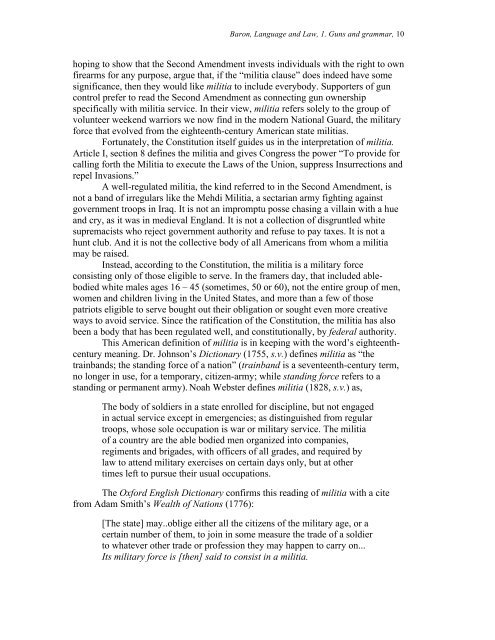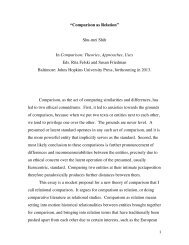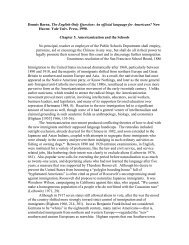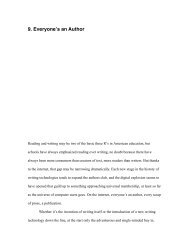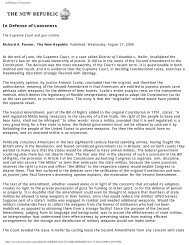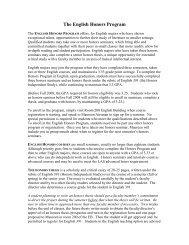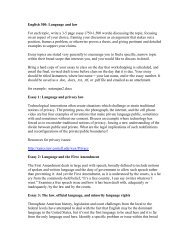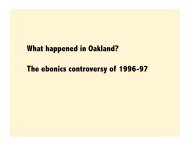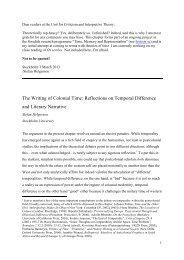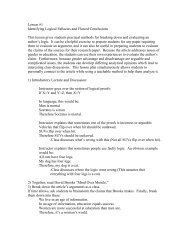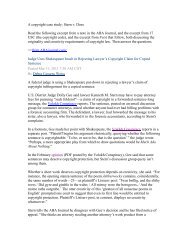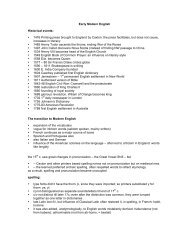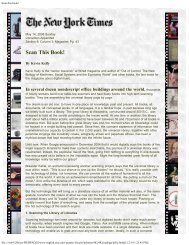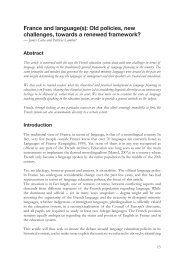1. Guns and Grammar: Determining what the Second ... - English
1. Guns and Grammar: Determining what the Second ... - English
1. Guns and Grammar: Determining what the Second ... - English
Create successful ePaper yourself
Turn your PDF publications into a flip-book with our unique Google optimized e-Paper software.
Baron, Language <strong>and</strong> Law, <strong>1.</strong> <strong>Guns</strong> <strong>and</strong> grammar, 10hoping to show that <strong>the</strong> <strong>Second</strong> Amendment invests individuals with <strong>the</strong> right to ownfirearms for any purpose, argue that, if <strong>the</strong> “militia clause” does indeed have somesignificance, <strong>the</strong>n <strong>the</strong>y would like militia to include everybody. Supporters of guncontrol prefer to read <strong>the</strong> <strong>Second</strong> Amendment as connecting gun ownershipspecifically with militia service. In <strong>the</strong>ir view, militia refers solely to <strong>the</strong> group ofvolunteer weekend warriors we now find in <strong>the</strong> modern National Guard, <strong>the</strong> militaryforce that evolved from <strong>the</strong> eighteenth-century American state militias.Fortunately, <strong>the</strong> Constitution itself guides us in <strong>the</strong> interpretation of militia.Article I, section 8 defines <strong>the</strong> militia <strong>and</strong> gives Congress <strong>the</strong> power “To provide forcalling forth <strong>the</strong> Militia to execute <strong>the</strong> Laws of <strong>the</strong> Union, suppress Insurrections <strong>and</strong>repel Invasions.”A well-regulated militia, <strong>the</strong> kind referred to in <strong>the</strong> <strong>Second</strong> Amendment, isnot a b<strong>and</strong> of irregulars like <strong>the</strong> Mehdi Militia, a sectarian army fighting againstgovernment troops in Iraq. It is not an impromptu posse chasing a villain with a hue<strong>and</strong> cry, as it was in medieval Engl<strong>and</strong>. It is not a collection of disgruntled whitesupremacists who reject government authority <strong>and</strong> refuse to pay taxes. It is not ahunt club. And it is not <strong>the</strong> collective body of all Americans from whom a militiamay be raised.Instead, according to <strong>the</strong> Constitution, <strong>the</strong> militia is a military forceconsisting only of those eligible to serve. In <strong>the</strong> framers day, that included ablebodiedwhite males ages 16 – 45 (sometimes, 50 or 60), not <strong>the</strong> entire group of men,women <strong>and</strong> children living in <strong>the</strong> United States, <strong>and</strong> more than a few of thosepatriots eligible to serve bought out <strong>the</strong>ir obligation or sought even more creativeways to avoid service. Since <strong>the</strong> ratification of <strong>the</strong> Constitution, <strong>the</strong> militia has alsobeen a body that has been regulated well, <strong>and</strong> constitutionally, by federal authority.This American definition of militia is in keeping with <strong>the</strong> word’s eighteenthcenturymeaning. Dr. Johnson’s Dictionary (1755, s.v.) defines militia as “<strong>the</strong>trainb<strong>and</strong>s; <strong>the</strong> st<strong>and</strong>ing force of a nation” (trainb<strong>and</strong> is a seventeenth-century term,no longer in use, for a temporary, citizen-army; while st<strong>and</strong>ing force refers to ast<strong>and</strong>ing or permanent army). Noah Webster defines militia (1828, s.v.) as,The body of soldiers in a state enrolled for discipline, but not engagedin actual service except in emergencies; as distinguished from regulartroops, whose sole occupation is war or military service. The militiaof a country are <strong>the</strong> able bodied men organized into companies,regiments <strong>and</strong> brigades, with officers of all grades, <strong>and</strong> required bylaw to attend military exercises on certain days only, but at o<strong>the</strong>rtimes left to pursue <strong>the</strong>ir usual occupations.The Oxford <strong>English</strong> Dictionary confirms this reading of militia with a citefrom Adam Smith’s Wealth of Nations (1776):[The state] may..oblige ei<strong>the</strong>r all <strong>the</strong> citizens of <strong>the</strong> military age, or acertain number of <strong>the</strong>m, to join in some measure <strong>the</strong> trade of a soldierto <strong>what</strong>ever o<strong>the</strong>r trade or profession <strong>the</strong>y may happen to carry on...Its military force is [<strong>the</strong>n] said to consist in a militia.


